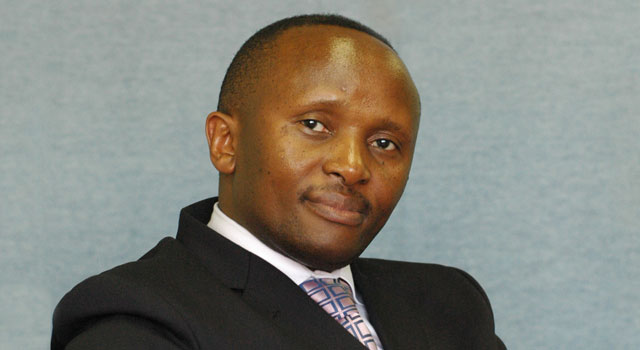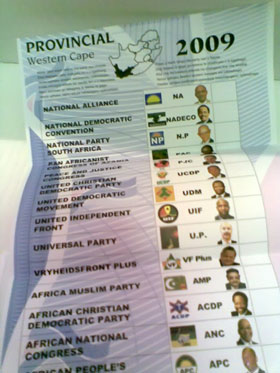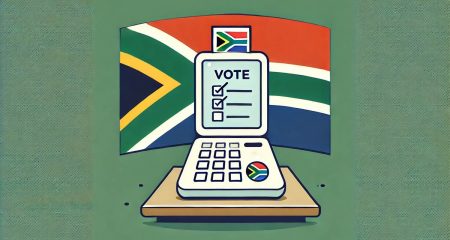
The Independent Electoral Commission (IEC) will conclude a study in the coming weeks in which it investigates the various forms of electronic voting and registration systems used worldwide, from electronic ballots to telephonic and Internet-based voting.
However, South Africa’s complicated political history means it’s unlikely the voting process will go paperless in time for the next national polls in 2014, or even in 2019.
Internationally, countries such as Australia, Canada, Estonia and Norway are embracing online voting. The Economist reported recently that Ireland, which spent US$66m embracing electronic ballot devices a decade ago, has scrapped its electronic voting project and returned to paper ballots. Electronic or machine-based voting, it appears, is growing in popularity in developing countries, but falling out of favour in developed ones, some of which are moving to online voting solutions instead.
“You have to look at the socioeconomic features of the countries where [electronic solutions] are used,” says the IEC’s chief electoral officer, Mosotho Moepya. “You have to ask, what are the problems that countries are trying to resolve by moving from one system to another?”
Moepya tells TechCentral in an exclusive interview that in the interests of thoroughness, the IEC has even looked at countries that have moved from one form of electronic voting to another. “We’re interested in the whole range of solutions,” he says, but adds that when considering paperless solutions, one must ask whether there is really a problem that paperless voting will solve.
One of the big challenges facing alternative polling and registration systems in South Africa is trust. Moepya cites the example of micro lenders, who often keep debtors’ ID books until loans have been repaid. “If we say anyone can register to vote for anyone else with their ID, we could encounter all sorts of problems.”
The IEC has to ensure it doesn’t interfere in any way with people’s right to vote. “People must register and vote in person. We ask you to come in person so there’s no argument tomorrow about it having been you. Many young South Africans think that in this age of technology they should be able to register from home. The problem with that is people can impersonate others.”
Other potential pitfalls of electronic solutions are the difficulties they present for auditors and the security risks, perceived or actual. “There is also the issue of access,” says Moepya. “If there’s one area where we are all equal, it is when we vote. We have the same ballot, the same candidates and the same ID book. The minute you begin to say people in Sandton and Waterkloof and Hout Bay can vote from home while the rest must stand in the sun, you have a problem.”

Moepya says the IEC has to tread carefully because there are “constitutional matters” at stake, too. “Whatever form of voting we contemplate must work anywhere in South Africa without reservations.
“We have 22 000 voting stations in SA, 5% of which still have no electricity or telephone lines. The kinds of technology we’re talking about require these. It can be mitigated with mobile technology and portable solutions, but because we have such unequal infrastructure availability it becomes more difficult to say we can serve everyone equally using different methods. We have looked at this, but we are unconvinced.”
Another obstacle to the uptake of electronic systems is education, or a lack thereof. “One must look at a system of voting that doesn’t get to a point that requires a certain level of education. One needs to take the low level of literacy into consideration when you design a system. Electronic voting does introduce an element of sophistication that may not be in line with where we are as a nation.”
Beyond the social implications of changing voting systems, there are also the costs to consider. The cost of changing systems is “fearsome”, Moepya says. “It could run into tens of billions of rand.” There is also the danger that the investment will quickly become outdated as technology advances.
Ultimately, it’s the need to ensure the electoral system treats everyone the same that may hold back any moves to introduce electronic or Internet voting.
Moepya says South Africa already has one of the most secure electoral systems in on the continent. This is thanks, in part, to the national population register that makes it more difficult for South Africans to impersonate others or vote more than once.
“There’s security in our ballot papers, too. People have been convicted for trying to reproduce ballot papers fraudulently.”
Overt security features include watermarks, logos and micro-printing of tiny text. “I can assure you, next year you’ll be presented with a beautiful ballot when you come to vote,” Moepya says.
The results of the IEC study into electronic voting solutions will be presented in March. — (c) 2013 NewsCentral Media
- Ballot paper photo: Warrenski/Flickr




